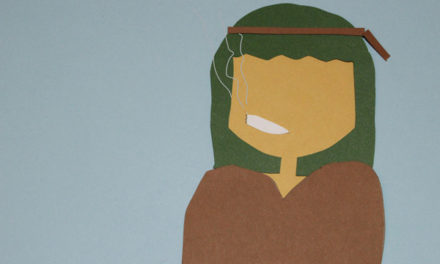In the beginning… everyone lost track of everything of importance in the beginning. Ok, not everything, but quite a bit. It seems in the quest of some to prove all the early stuff in Genesis literally happened, most of the poetic points of the story have been deemphasized or completely ignored. As we looked at in the last post, not understanding the beginning of the story is catastrophic. So let’s look at a few lost points:
1. Adam = Man (or Human)
If someone named a movie character “Human” you would expect something. Maybe you’d expect the movie to say something about being human through that character. Maybe you’d expect to relate to that character in some universally human way. In any case, it would suggest something poetic and human is about to happen.
This is exactly what happens in the Genesis creation story. Adam is Hebrew for Man, Mankind, or Human. This is big news if you are trying to make sense of this story in the context of evolution. Adam could simply represent humanity at a certain point. If you are in the creationist camp, it is still of great importance that you understand the poetic significance of this.
2. Image = Idol
God created humans in his image… So what? It’s more than a feel-good-about-yourself phrase. When an image is created of a god at that time, it meant something. It’s what we call an idol. Why do you think God commanded that no image be made of him? …because he already had one.
We’ll talk more about how we get this understanding and the ramifications of it in later posts, but I do want to throw this in here: This doesn’t mean we’re to get all religious, bowing, and praying to each other. It does mean, what you do to your neighbor, you’re doing to this God.
3. Fall = Knowledge (Good + Evil)
This we mentioned in the last post. “The Fall” as it’s called is SO much more than a couple people eating fruit. That fruit was called “the fruit of the tree of knowing good and evil.” What a name!!! How can we ignore that name?!
I’d suggest we think of it as a metaphor. (Even if it “literally happened” there is still a metaphor you have to take seriously.) People now knew good and evil. This is apparently a new thing for them. Plus, they’re now eating the fruit of that knowledge.
Think of it like a kid learning right from wrong. Then at one point the kid eats the fruit of that good vs evil and starts feeling shame for their wrong doings. Make sense?
What is that metaphorical fruit? Why would God figuratively or literally put it in his garden? What part does sin play in all this? We’ll have to get to in later posts. (Sorry.)
4. God Doesn’t Run
This was also mentioned in the last post. When the fruit was eaten, God didn’t separate himself from humans in the Biblical text. In fact he goes to the humans. His holiness apparently was no issue. God seems to act like Jesus (big surprise). He doesn’t seem to have the relational issue the humans do.
The story I was told growing up was: Humans are sinful, so we can’t be with a holy God. But Christ came and took our sin on himself so we could.
Are you starting to see the trouble. First, the fall story doesn’t seem to be about sin, but about the fruit of knowing good and evil. Second, the holiness of God didn’t get in the way of God/human interaction.
What does this mean? …we’ll get there. …but maybe not all in this post.
5. Garden -> City
Have you ever seen a movie where the hero returns home at the end, and though everything is the same, things are different? Of course you have. Think of Sam in the The Lord of the Rings, Dorthy in The Wizard of Oz, or George Bailey in It’s a Wonderful Life. The Bible has that too.
I heard Skye Jethani discuss this in ideas he eventually put into the book Futureville. In brief, he was saying the story starts with a garden but ends with a city. In other words, this story is going somewhere. Time on this earth isn’t a waiting room to heaven. It’s participating in the creation of something beautiful.
Finally
So, in the first post I wanted to get across how beginnings matter. This one I wanted to take a broad look at key (and frequently missed points) in the Christian narrative’s beginning. From here we’ll look more closely at these things in the next posts. (Thanks for your patience.)



